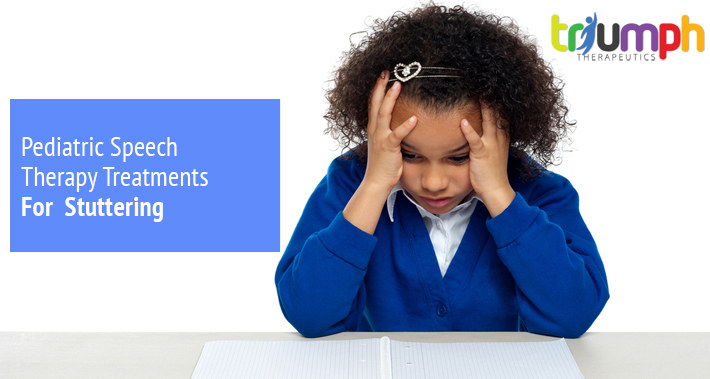Pediatric Speech Therapy Treatments For Stuttering
https://www.triumphtherapeutics.com/wp-content/uploads/2022/05/Triumph-Therapeutics-Speech-Therapy-OT-Physcial-Therapist-Washington-DC-May03-01-2022.jpg 710 379 Triumph Therapeutics Triumph Therapeutics https://www.triumphtherapeutics.com/wp-content/uploads/2022/05/Triumph-Therapeutics-Speech-Therapy-OT-Physcial-Therapist-Washington-DC-May03-01-2022.jpgNo one wants their child to feel uncomfortable speaking, but for some children who struggle with stuttering, that feeling can be a reality.
If your child has a stuttering disorder, there is help available.
Pediatric speech and language therapy can make a big difference.
Interested in learning more?
In this article we’ll take a closer look at stuttering and how working with a pediatric speech therapist can help.
But first, let’s get a better understanding of what stuttering is.
What Is Stuttering?
Have you ever been so tired, you feel like you can’t string together a proper sentence without stumbling over your words or getting tongue-tied?
You can laugh about it because you know that when you get some rest or drink a cup of coffee, you’ll stop struggling with your words.
For a child living with a stuttering disorder this feeling is no laughing matter.
Stuttering is a speech disorder that impacts roughly 5 to 10 percent of children.
The characteristics of stuttering such as repeating parts of words or having trouble getting words out are called disfluencies.
Not all children with a stuttering disorder demonstrate the same disfluencies, however – there are a number of different types, which we’ll look at later in this article.
While many children actually outgrow stuttering, it’s still a good idea to see an early intervention pediatric speech therapist, since addressing a stutter at a young age tends to have better results than waiting until they’re older.
Different Types Of Stuttering
It’s help to know that not all stuttering disorders stem from the same cause or from the same area of the brain.
These are the three types of stuttering.
1. Neurogenic Stuttering
Neurogenic stuttering occurs when the brain has trouble communicating with the nerves or muscles.
This type of stuttering can occur if your child has experienced a traumatic brain injury.
2. Developmental Stuttering
There’s a lot going in a child’s body and brain as they develop.
Developmental stuttering usually occurs in children younger than five as they develop speech and language skills.
It’s a bit like the old adage, practice makes perfect.
The child is developing these abilities and stuttering can be a result of the challenges of the process.
Developmental stuttering usually resolves without treatment.
3. Psychogenic Stuttering
Psychogenic stuttering is connected to emotional trauma.
It occurs because of impacts to the area of the brain supports thinking and reasoning.
Stuttering Causes
If you struggled with stuttering and now your child is too, you might be wondering whether or not this is a coincidence.
There is no one single known cause for stuttering disorders, but a family history of stuttering can be a contributing factor.
Other possible causes of stuttering can include
- Nervous system function, or neurophysiology
- Small differences in the brain
- Family dynamics
How To Tell If Your Child Has Stuttering Disorder
Most of time, if a character in a movie has a stuttering disorder the stutter is portrayed by partial word repetition (p-p-p-partial).
But did you know there are a number of other signs of stuttering disorders?
Some children with a stuttering disorder may not actually struggle with partial word repetition.
Other symptoms of a stuttering disorder include
- Avoiding using certain words or avoiding talking all together.
- Not finishing a thought or pausing mid thought.
- Prolonging sounds in some words (ssssssuch as this).
- Seeming frustrated when trying to communicate.
- Adding extra sounds into sentences such as “um.”
- Excessive eye blinking or other facial tics.
- Repeating whole words or phrases.
Stuttering in children can also lead to pediatric developmental delays, particularly in social skills development.
A 2020 study by Choo, Smith, and Lee found that stuttering is more common in children who also have learning or reading disabilities or ADHD.
One of the tricky things about trying to understand if your child may have a stuttering disorder is that stuttering can be impacted by mood and can look different from one day to the next.
You may notice at a time when your child is particularly stressed or excited, the signs of a stuttering disorder are more noticeable than when they are feeling calm.
Keeping track of what symptoms of stuttering disorder your child is demonstrating will be beneficial when you seek support and treatment.
What does help for children with stuttering disorders look like?
Keep reading to learn about how working with a pediatric speech therapist can help.
How Can A Pediatric Speech Therapist Help With Stuttering?
If your child is struggling with stuttering, it’s best to seek help and intervene early.
Some disfluencies in speech are not problematic, but stuttering can be.
If you think your child is struggling with stuttering, a pediatric speech therapist can help in the following ways
- Conduct a pediatric evaluation to help determine if your child stutters and if the stuttering is impacting your child’s ability to participate in day to day activities like school and play
- Work with your family and the child to create a treatment plan unique to their needs and stuttering challenges
Everyone is unique and treatment for a stuttering disorder can be dependent on a number of different factors.
A speech therapist may offer a treatment plan which includes
- Helping your child change how they speak through direct tools and actions
- Offering strategies for you to indirectly make things easier for your child such as slowing down your own words
- Helping the child learn ways to feel less tense or stressed when speaking
- If the child is older or a young adult, they may offer additional resources such as support groups for individuals who stutter
Book An Appointment With Triumph Therapeutics Today h2>
Do you think your child could benefit from working with a pediatric speech therapist?
Book your appointment with Triumph Therapeutics today.


